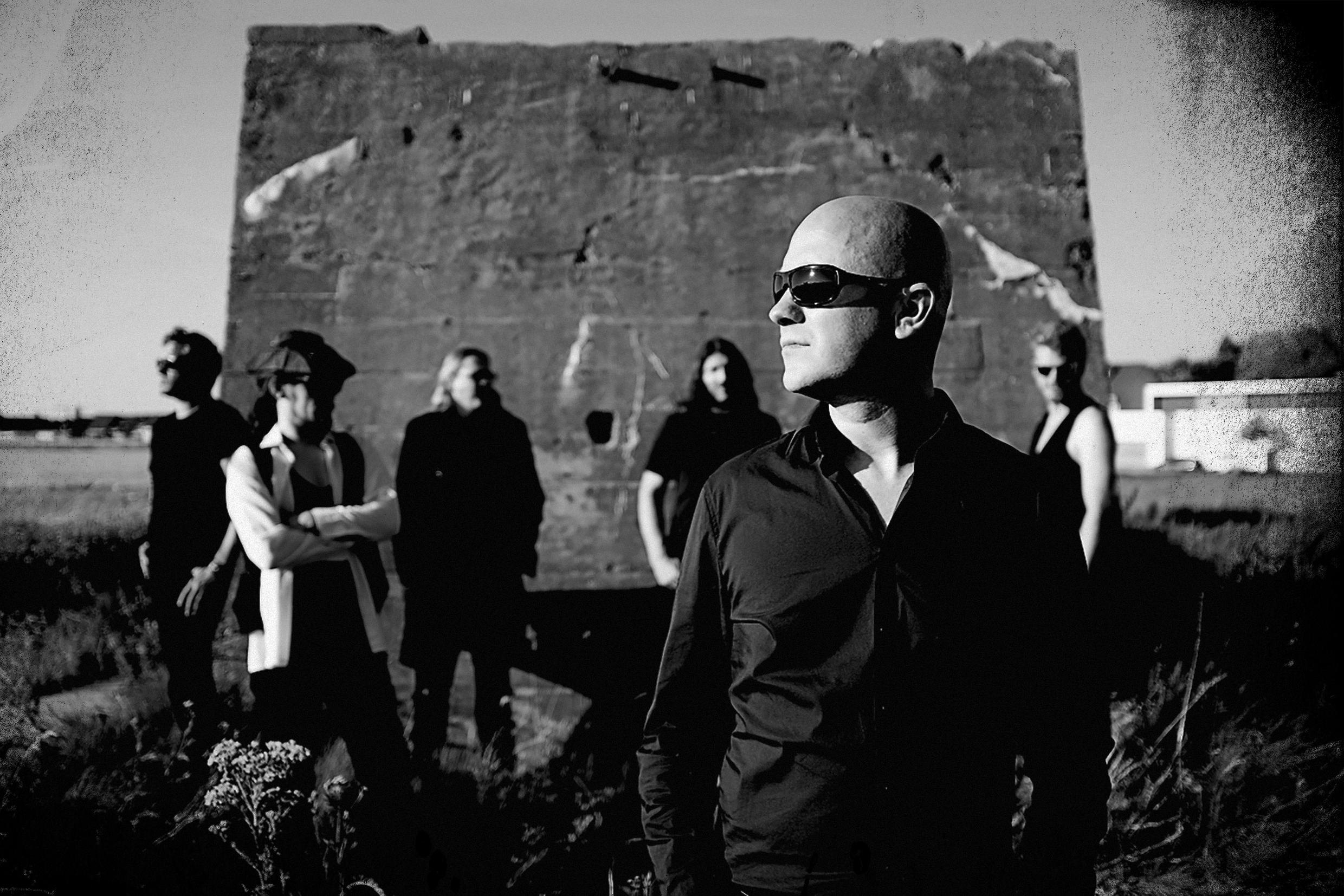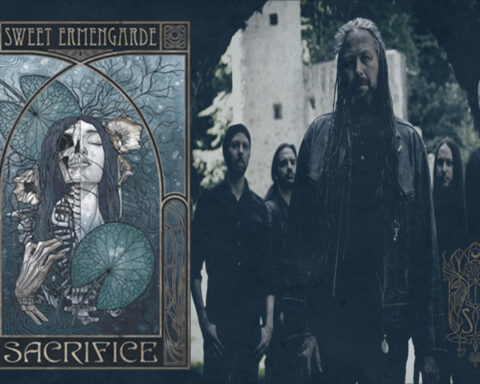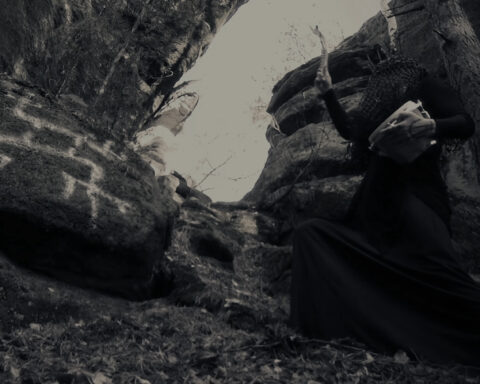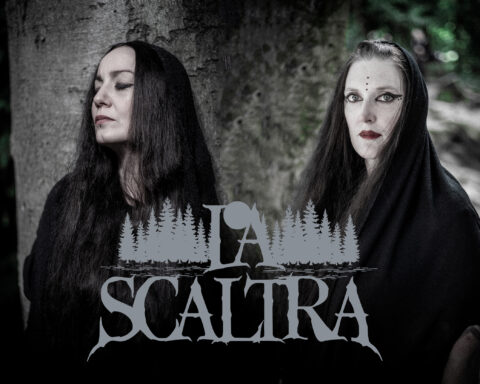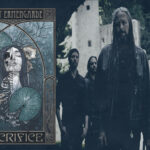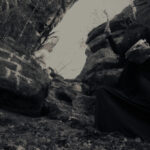Many things, emotions, events, states of mind inspire us. Often these are the inspirations that we unconsciously experience at first through pictures, words, or encounters and that later return to our memories and thoughts and leave something lasting behind. Such as the question during an earthly life:
“Why do we even love when we know that everything has to end?”
Jan, congratulations to your new fulltime album “Echoes from the Bardo”! You named it with: “the most personal record to date”. Please allow me to start with one last thought of your latest words in the last Solar Lodge interview in summer. “When making music, new ideas also spontaneously pop up. It all pretty much comes together while working on the songs. It’s like the pieces were already there, but at some point, you start seeing the general images of the puzzle.” Is the puzzle complete for your new album?
Yeah, pretty much. It really feels good overlooking the whole project now. It all makes sense to me: the songs, the lyrics, the concept and the artwork. I never felt that complete finishing an album in fact. Now I hope people will like it as well, and I hope they will resonate with the underlying concept of the album. A funny thing though, once the puzzle is completed, the pieces start to change again and take new shapes. The perspective changes and gives me, even while being the writer of the puzzle, an exotic feeling.
You mentioned the novel of George Saunders “Lincoln in the Bardo” as a main influence for your new album. Saunders mixed parts of the real “Tibetan book of the dead” with his fiction novel. The Tibetan text describes, and is intended to guide one through, the experiences that the consciousness has after death, in the bardo, the interval between death and the next rebirth. Are all the songs on your album woven into it? (interval between death and rebirth)
The book itself was rather okay-ish, although I liked the experimental way he compiled the novel out of a rather chaotic collection of quotes. But apart from introducing the ‘bardo’ to me, I wouldn’t call the novel a real influence for the album. I liked the way he tore the concept free from the Tibetan and Buddhist background though. I went a step further, and tore it free from any religious connotation, so it could become a symbol for the very core of what Your Life On Hold is about: being stuck, whether it is in between thoughts, or in between stages in your life. All songs, one way or another, deal with that general idea. In fact, sometimes lyrics are interwoven with each other as some lines are returning in various songs. And if you listen closely, you might discover there’s a certain little synth melody with ‘phantasy’ bells coming back every now and then throughout the whole album. It should be understood as the ‘bardo’-theme.
George Sanders made the following statement about his book in an interview: „So I think there’s a sense in the book of the horror of this, especially weighed against the briefness of our time here on earth and the uncertainty of what lies ahead for us after death. And in this bardo state, it is clear that the superficial differences between us are trivial, and any hatred generated by these differences is even more catastrophic and inexcusable.” Would you agree with my thesis, that your album affects their listeners in the same mood?
I think that’s a very true and philosophical idea of Sanders. Seen from Andromeda (a comparison I often like to make when philosophizing), our human lives make absolutely no sense at all in this enormous vast universe. It’s trivial; and given the short interval we’re here on this earth, it’s a pity we’re making such a mess out of it. Human life is a curse and a gift, as Camus puts it. We didn’t choose for this pointless short interval on this planet, but knowing that, we have the liberty of making something worthwhile out of it ourselves. We’re cursed with the gift of bringing colour to the grey absurdness of life. You started the interview with a quote: “Why do we even love when we know that everything has to end?” Camus would say: loving makes that short interval called life way more pleasant. And I agree!
You describe “the bardo” in your booklet with: “between two worlds, between past and future, between two broken hearts, between darkness and light”. From the first beginning of hearing your songs it felt often like opposites, darkness (e.g. the songs “Let’s start a war” and Let’s start a fire”) locked up emotions… is the state of the bardo the all-encompassing red thread in your musical work?
Yes. Putting it this way, the album could be seen as a concept within a concept, because the general idea behind Your Life On Hold could be understood as this very bardo-state indeed. The human psyche is a barrel full of contradictions, and when in despair, those contradictions reach the surface more easily. Like in comic books: everyone has that little devil and angel on their shoulders saying conflicting things. In the bardo-state, that in-between zone, there’s a collision with those conflicting thoughts, which makes you reflect about your very own opposite ideas and mindsets; but you also have the chance to make up your mind and choose a new path consciously. That’s the ‘light’ hidden in the darkness of my work: there is hope. But you might need to look closer to discover it. 😉 The album deals both with being stuck and feeling desperate, but also about the chance of escaping that dark place. And the ‘bardo’ is of course the main and general symbol for being stuck in the void.
I really like the 6 panel digi pack with mat finished style. It looks very noble and perfect together with the front cover. The cover acts like a symbiosis to me: life, death, rebirth, intermediate state. What are the reasons for this cover? Why is the human head blindfolded?
I think that was indeed what I wanted to do: life, death, love, the beating of a heart; it’s all part of the machinery of life. And the very core of the person we are now, is often deeply rooted in the past; hence the tree roots in the artwork. “You can’t change the future, when you’re stuck in the past.” That idea is reflected in the lyrics of ‘Save me from the void’, lyrically one of the key tracks of the album.
The human face is blindfolded because it doesn’t want to see. Refusing to see the light, refusing to face the truth, or renouncing the courage for a new start, is exactly that what keeps us in the dark, or in the ‘bardo’. That’s what I mean with the words “Let’s start a fire, let’s start a war, let’s start something worth fighting for”. Sometimes it takes a little courage to start a new chapter, to leave the ‘bardo’. Sometimes you have to ‘go through the fire to the light’, as Lou Reed stated in a particular song.
You have made a special signed info sheet with many explanations of which messages your music and text should convey. Is it easy or difficult for you to write such descriptions? In this info sheet the name Zsolt T. Szajbely is noted. Please tell us about this artist and his role in the band/artwork of YLOH.
I got to know Zsolt T. Szajbely as he was a fan of our music. It started with some ‘likes’ and comments on social media first, but I soon noticed his unique way of approaching and appreciating art. After becoming ‘friends’ on Facebook, I learned more about his true passion for art, literature, photography and cinema. And I also discovered his own rather impressive photographic skills. We became real friends, and knowing his lyrical and philosophical way to approach art, I figured he was the ideal man to write an essay on the new album. I think he did that wonderfully. His photographic artwork is also used for my projects Mildreda and Mildred in Oblivion, so there’s an ongoing collaboration happening.
You restyled the band name/logo a little bit and created the name of the band only with the first letters. Is there a special reason for that?
The new logo is more like an ‘extra’ logo, as we’ll keep on using the play button as well. In fact, if you look closer to the cover artwork, you might discover the play button hidden somewhere in there. 😉
This is the first time, that YLOH releases a limited pack. How did the selection of things (shirt, pin, special info sheet) for the package come about?
It was a kind proposal from Artaud in fact, and I’m really happy Solar Lodge made this possible. Music business is struggling, and packages like this make it interesting and attractive for the fans. I’m really grateful for this, both towards the label as towards music lovers.
Wish time: what thing, clothes, addition could be a unique one for a forthcoming YLOH special fan package? Or do you know about already some wishes from the fanbase?
As I often make alternative versions for songs, it might be a cool idea to have those compiled on a limited cd to accompany our fourth album. And a vinyl release is definitely still on my wish list.
“Anywhere out there” and “Nowhere train”: these two songs are and will be incredibly well received by the Solar Lodge community. I’m very sure of that. There are many people already very enthusiastic. And I am one of them. Does it feel the same to you? Or is there already a “distance” to your songs meanwhile you are doing other promotion things in these days?
As an artist, you’re always somewhere else on the timeline. While your own journey ended, it still has to start for the audience. So you have to jump back and forth. Sometimes it feels weird, but for this album it felt good. I stayed focused making trailers, videos and additional artwork for promotion. After finishing an album, I also like to dive into something completely different. It can be very inspiring and enlightening doing that. I started working on material for Mildreda, for my new dark ambient project Mildred in Oblivion, and on the side of all this, I also produced and wrote the music for the new Dive album with Dirk Ivens. In this ongoing adventure, it felt great to have those first two singles being released. It was heartwarming to see people liked it.
I am not able to describe it better than Zsolt T. Szajbely: the “heavy sounds and the purest kind Byronic romanticism” stand for the opposites in the songs like “Let’s start a war”, “Let’s start a fire”. Your vocals are aggressive, intensive, and then the song drifts away into such a sonorous atmosphere, the guitars are so harmonic for a short while…. Your interplays between fast, aggressive, and calm, spherical parts: outstanding! And it is getting more and more perfectly matched since your first album. This variety makes it: a great work of art, music and lyrics. Like a symbiosis… at what point in creation do you notice that something like this comes out?
Waw, you’re too kind really. 😉 Thank you! I guess Nine Inch Nails taught me you can switch from heavy to quiet in one and the same song. NIN also taught me quiet can be painful and harsh while loud can be uplifting and peaceful. If you don’t get lost in translation but tell the story right, you can use any language. And that’s what I want to do: I try to get the story right in my songs. Sometimes heavy guitars are the best way to translate a certain idea, sometimes I need repetitive dreamy guitars. I like to switch back and forth without losing focus on the story.
You’re also very productive visually these times. There are already two videos released and the third is coming. Is it a stylistic device for you to often have a model in the video? Recognition value, branding of YLOH vids maybe?
Like we did for the debut album, with a photoshoot by Ghilain Vermeersch and using those pictures throughout the whole narrative, I wanted to do that again for the new album. Like a character in a movie, the face becomes familiar and a spontaneous association with the music, the ideas and the concept. I was very happy to work with Sil Torfs, she’s beautiful and really cool to work with. The plan was to have her featured again in the third video, but corona, unfortunately decided otherwise.
Why do you choose “Erase me” for the third video release?
‘Erase me’ is a personal favorite track of the new album, and hearing the feedback on the album, it seems I’m not the only one liking especially this track. So the choice to have another video for this particular track was an obvious one.
“Imprisoned” touches me deeply. The guitar sound is moving and fantastic in combination with your voice and lyrics. “Can we erase the dark days, can we erase the past”. A very personal insight of your soul? A dialogue with yourself, questions that cannot be answered?
Thank you, I’m always very happy to hear when both the lyrics and the music touch another soul out there. In the movie “Eternal Sunshine of the Spotless Mind” you could have your memories erased. Some memories are indeed rather painful; they come back in waves and trouble the mind, like an annoying ringing in your ears. The idea of being able to erase those painful memories is tempting. But on the other hand, memories define who we are now. Erasing them would mean erasing yourself…
This pandemic is still alive, and it will be harder in the next months, almost in all countries of the world. You posted news from latest rehearsals. How is the current situation about? Especially in Belgium? Are any live gigs are planed?
Yes, we started doing rehearsals which felt absolutely awesome. Unfortunately we had to cancel the rehearsals again as bars had to close once more because of corona. We rehearse above a pub, so we had to postpone things once again. The situation is pretty bad in Belgium. And it pains me to see how many people don’t act responsible, but selfishly don’t bother to be more careful. But anyway, yes, we started rehearsing and we’re jamming with the intention of making a fourth album, the very six of us together. It feels great working on songs that way. Currently, there are no live plans for the near future, the cancelled ones still need to be rescheduled, I really wonder when live events like in pre-corona times will be allowed again.
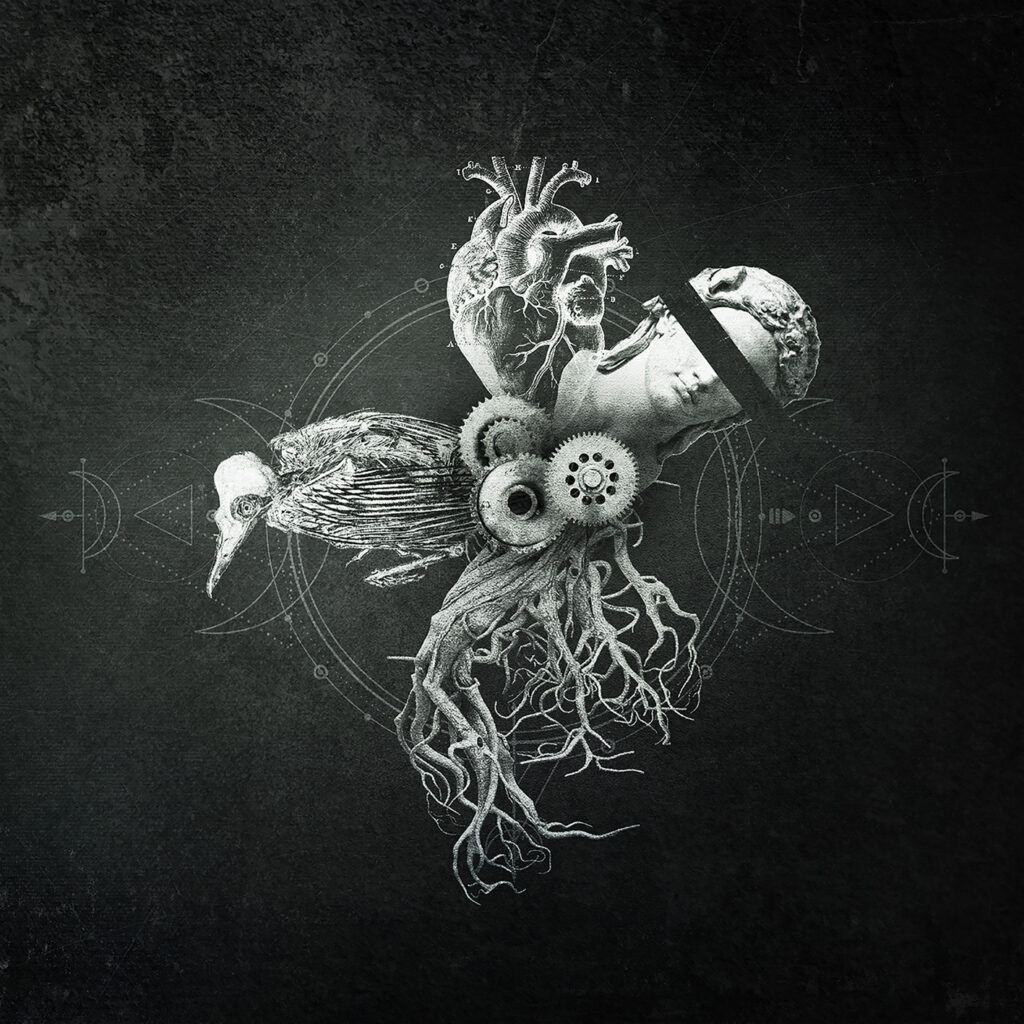
„All songs hold different ideas and thoughts, as if they were broken dreams, carefully repaired with golden glue. It’s the shining light hidden in the dark, holding things together.” Can you mention two songs, which exactly meet this description? Or do you have a special picture in your head by reading this description of yourself and YLOH music?
Apart from the ‘bardo’ as general concept, there’s another underlying idea interwoven in the album: the concept of ‘kintsugi’, the Japanese art of repairing broken pottery by mending the breakage with golden glue. I like to think of the songs as if they were broken pieces of my soul, carefully repaired with that ‘kintsugi’ golden glue. The music of Your Life On Hold is rather dark, gloomy and melancholic, but there’s always some light and hope hidden within. The idea of ‘kintsugi’ and the golden glue bringing broken things back together fits that idea: it’s the shining light hidden in the dark indeed.
The idea of Kintsugi can be discovered in these words, meant as a love poem, interwoven within ‘Anywhere out there’:
Like a light in the dark
I can see you
Patched up together
With golden glue
The lines on your skin
Stories unfold
Beautifully broken
Shining like gold
I would like to thank you very much for your new, brilliant work. I really appreciate it from beginning to the end. Now I will keep on reading “Lincoln in the Bardo” and so literature and music come together again in a miraculous way for me, too. Health and optimism for all of your band members, friends and family! See you soon somewhere, somehow…on stage and beyond hopefully!!
Thank you for the kind words and the great interview!

